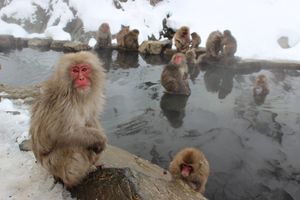Female Monkey Takes Top Spot

In Oita, on the Japanese Island of Kyushu, a female monkey is breaking gender barriers. The monkey, known as Yakei, is a nine-year-old Japanese macaque and is currently the leader of more than 600 other monkeys. It is the first time that Takasakiyama Natural Zoological Garden has seen a female monkey ascend to the top position in its nearly seventy-year history.
Japanese macaques are also known as ‘snow monkeys’, and they are recognizable for their pink bottoms and enjoyment of outdoor hot pools. Male snow monkeys live for 28 years on average and are about three kilograms heavier than females. Ordinarily, one male in a troop has alpha status, and that changes when he leaves or dies.
Last year, Yakei became the top female when she beat up her own mother. Then, surprisingly, she attacked several high-level males before finally defeating the ranking alpha, a 31-year-old named Nanchu. Takasakiyama wardens checked her status with a ‘peanut test’. When given peanuts, the other monkeys backed away to let Yakei eat first.
Yakei has been exhibiting other alpha behavior, such as shaking trees and walking around with her tail up. In Japan, where women have struggled to break into traditionally male-dominated leadership roles, people are keenly watching to see how long Yakei can stay in the top spot.
Sources: mainichi.jp, nytimes.com, theguardian.com, wikipedia.org
For source links, see the article on ESLNewsStories.com
Audio
Hear the article spoken:
Useful Language
- Gender barrier (n) - a limit that people face in society because of their gender
- Ascend (v) - to go up, rise
- Troop (n) - a group of monkeys
- Alpha (adj) - the most powerful animal or person in a group
- Status (n) - the social position of something
- Beat up (phr. v) - to hurt someone by hitting them
- Warden (n) - a person who looks after a place
- Exhibit (v) - to show something
- Male-dominated (adj) - controlled mainly by men
- Keenly (adv) - in a way that shows a lot of interest or enthusiasm
Discussion
Discuss the following questions with your partner(s).
- Have you been to Japan? What did you do there? If not, are you interested in visiting?
- What skills does a good leader have? Are you a leader, or do you have leadership potential?
- How are leaders chosen in your country? Do leadership contests get physical?
- Does your community need more leaders or more team-players?
- People enjoy watching monkeys. What is interesting about them?
- Yakei has become a little bit famous. Can you think of any other famous animals?
- Are you an ambitious person? Do you want to achieve a lot in your life? In what areas of life are you most ambitious?
- Are there many women in leadership roles in your country? Can you think of some examples? If not, why not?
- Males are usually physically stronger than females. What is the value of physical strength in today’s world?
- When people get angry, there is a higher chance of physical violence. How can people calm down?